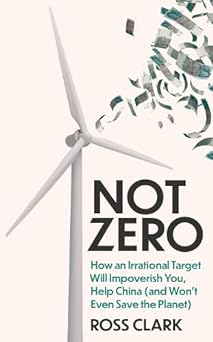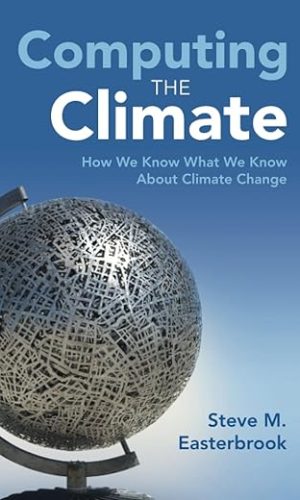Not Zero: How an Irrational Target Will Impoverish You, Help China (and Won’t Even Save the Planet)
£12.99
‘Bravely challenging the Establishment consensus … forensically argued’ – Mail on Sunday
The British government has embarked on an ambitious and legally-binding climate change target: reduce the country’s greenhouse gas emissions to Net Zero by 2050. The Net Zero policy was subject to almost no parliamentary or public scrutiny, and is universally approved by our political class. But what will its consequences be?
Ross Clark argues that it is a terrible mistake, an impractical hostage to fortune which will have massive downsides. Achieving the target is predicated on the rapid development of technologies that are either non-existent, highly speculative or untested. Clark shows that efforts to achieve the target will inevitably result in a huge hit to living standards, which will clobber the poorest hardest, and gift a massive geopolitical advantage to hostile superpowers such as China and Russia. The unrealistic and rigid timetable it imposes could also result in our committing to technologies which turn out to be ineffective, all while distracting ourselves from the far more important objective of adaptation.
This hard-hitting polemic provides a timely critique of a potentially devastating political consensus which could hobble Britain’s economy, cost billions and not even be effective.
Read more






by Verity Durward
A very lucid and well researched account of the net zero fallacy. With known technology neither we nor any other country can achieve net zero without destruction of our current standard of living and a retrograde future.
However much we may wish for progress, without the enabling technology they won’t happen. This is essential reading for the open minded who want to understand the issues rather than bow to dogma or the oppression of zealots.
by Alan Hibben
Written by someone who understands math and physics.
However, leaves unstated how politicians and activists can continue to lie to their public’s about “net zero by…” and get re-elected.
by Eljay
I feel much more informed on the subject of Climate Change now… understanding more about the real risks, costs and technologies involved with both CO2 emissions themselves, and those promised to reduce them.
by Mellie
Immediately draws the reader in and looks to be a great read. As with other comments, I would like to see a proper critique of the IPCC’s latest report with reference to Clintel (Climate Intelligence) who recently produced a report on the ‘serious errors’ of the UN’s understanding of climate fluctuations. Otherwise, well done!
by Chae
The first few chapters are excellent, full of closely argued and very relevant data. The next few chapters seem never to have been reviewed by a competent sub-editor – there are multiple repetitions. The final chapters are completely irrelevant to the purpose and title of the book. My four-star rating reflects the very high value and significance of the early chapters.
by Ian B
It is sad that around climate change, opposing hostile camps have formed, with little or no time for each other’s views, rather in the way of religious conflicts. I’ve been very concerned about climate change for a long time and have tried to take practical steps to help. However, not being a zealot, I found Ross Clark’s book not only very readable but rational and well-argued. It is clear that he is not a climate change sceptic, nor a zealot, and makes a very good case that the UK in particular, but not alone, has embarked on a path to failure, something I’d already concluded. To add to this, false accounting makes the current picture look rosier than it is.
by Mrs Susan Steatham
Great book full of facts, figures and information on the push for Net Zero and the real cost to the developed world in loss of jobs and lifestyle to which we’ve become accustomed. If you’re for or against the climate change disaster theory I highly recommend reading this.
by Baba Jaga
This book is written from the point of view of an angry british businessman who can see through the propaganda related the the “bad CO2” narrative and who is particularly upset by the irrational decision of the UK government to make a legally binding promise of making Britain a “zero carbon” state by a fixed date, 2050. In essence, it demonstrates that in all likelihood, this goal is either going to be missed or the outcome will have to be faked (for example by moving “dirty” industries to other countries where they will continue polluting, perhaps even more than now). Moreover, there are major technical and physical problems with the so called “green energy” for which there are no feasible solutions. Alternatively, Britain will have to commit an economic suicide and all its energy hungry industries will have to be abandoned.
The author clearly knows the matter and backs up every conclusion properly.
What I did not quite like, is that the book uncritically accepts the false narrative of CO2 being the source of all problems, much in line with what is trumpeted by ICCC. But we all know how biased ICCC is. It is paid to promote the “bad carbon” agenda and it does it. Their science have been questioned by so many serious scientists. Instead of seeing the obvious, that CO2 from the point of view of physics cannot be the primary green gas, that methane and especially water vapours are far more important, the book goes on about the “decarbonisation”. In other words, while burning fossils fuel definitely needs to be reduced, simply because once they get used up, our chemistry and agriculture will immediately collapse, the story about “bad CO2” is a hoax, used by clever machinators to make huge money.
I would advise anyone who reads this book also look for many other books which argue against the alarmist “CO2-induced catastrophe” legend. And, by the way, the whole concept of man-made global warming. The truth is, nobody can be sure why temperatures on the Earth undergo these slow changes of which this planet has seen already so many, including multiple “ice ages”.